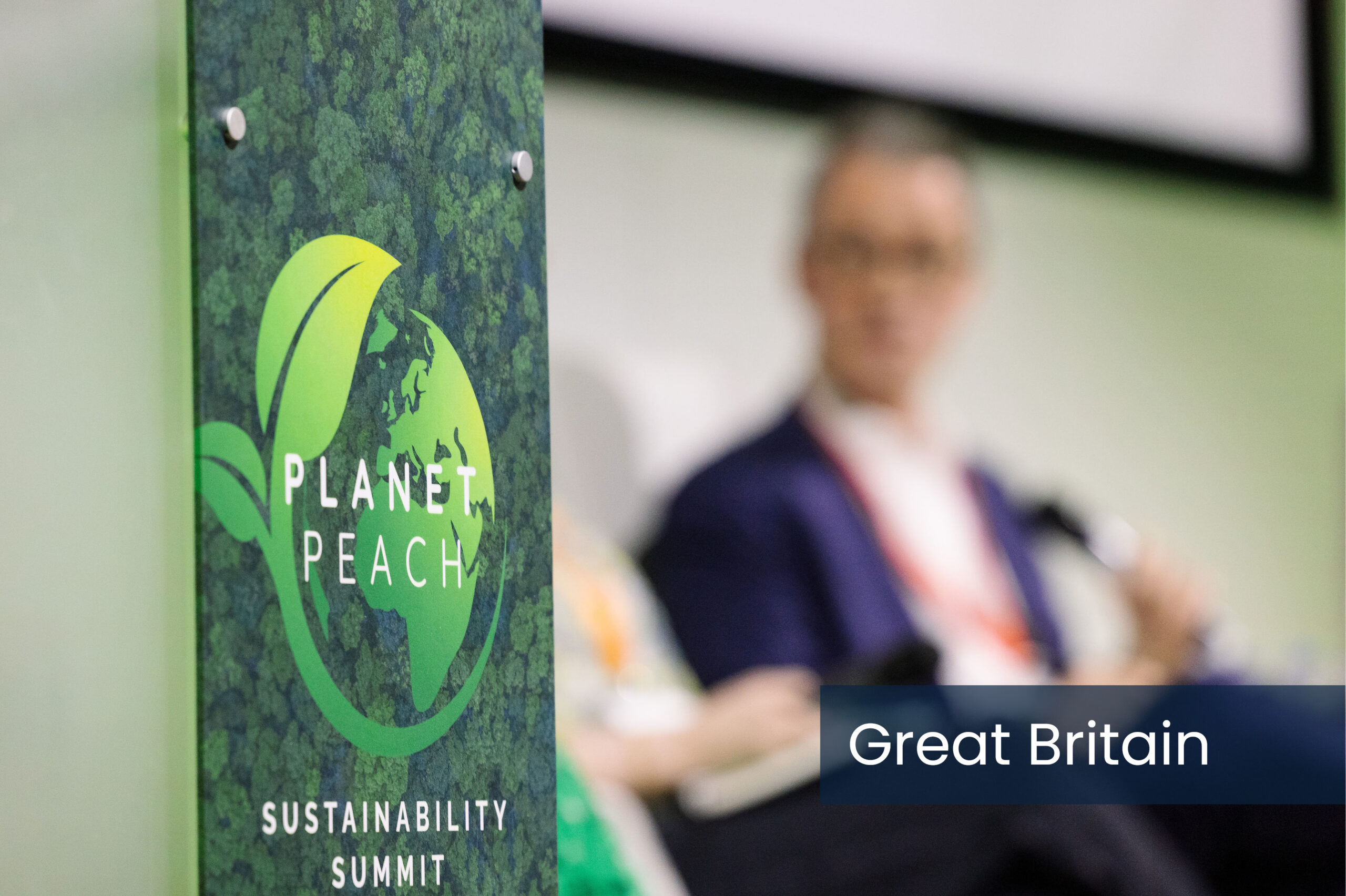 His warning was stark, but it was far from doom and gloom among the audience he addressed at the Planet Peach Sustainability Summit. Over 230 leaders from more than 130 businesses across the hospitality and food and drink sectors came together at 30 Euston Square to debate, educate and collaborate on the all-encompassing topic of sustainability.
His warning was stark, but it was far from doom and gloom among the audience he addressed at the Planet Peach Sustainability Summit. Over 230 leaders from more than 130 businesses across the hospitality and food and drink sectors came together at 30 Euston Square to debate, educate and collaborate on the all-encompassing topic of sustainability.
Dimbleby, author of The National Food Strategy and the best selling book Ravenous, set the scene with his manifesto for fixing the ‘broken’ global food system and the role hospitality can play in driving change by acting together.
Here are eight other takeaways from a fascinating event.
1. Collaboration is vital
A consistent theme throughout the day was the importance of collaboration to drive down emissions, and nobody does this better than Zero Carbon Forum. CEO Mark Chapman shared examples of how collaboration can accelerate best practice and help businesses do things more efficiently. Zero Carbon Forum and UKHospitality are crucial for knowledge-sharing and helping businesses to develop their own plans.
2. Scope 3 is ‘a shared problem’ and suppliers want to help
Some 70% of the hospitality sector’s CO2 emissions come from Scope 3, and as Nutritics CEO Stephen Nolan put it: “Your supply chain’s emissions are your emissions – it’s a shared problem… But making progress is win-win, as reducing emissions will benefit suppliers and operators.”
Nestle Professional began investing in sustainability projects in 2003, and sustainability was for many years “a lonely journey.” MD Katya Simmons revealed that sustainability was the only cost not to be cut in recent years in a turbulent market. “It’s about long-term future, not immediate costs… We know it will pay off down the line.”
Thomas Heier, CEO of Wagamama, liked that working with suppliers can be a two-way street: “Some suppliers are helping to educate us, we’re helping to educate some others.”
Caravan’s MD Jo Fleet extolled the virtues of long-lasting relationships with suppliers, who feel encouraged and empowered to invest in sustainability initiatives.
As Shaun Allen, CEO of Prestige Purchasing, pointed out, collaboration can reduce costs and environmental impact: “Peppers on the menu in April and May is the worst time for price and carbon footprint. If you could be more seasonal or local, you would improve your carbon footprint and you’d be in a better place from a cost perspective.”
Simmons firm belief is that the best plans can only be achieved by bringing all critical decision makers to the table, not just sustainability leaders.
3. Sustainability really matters to investors
A financial institution’s Scope 3 emissions are the companies they invest in, explained Amy de Marsac, Director of Investor Relations and Sustainability, Mitchells & Butlers – and so climate is a major risk, and opportunity. ESG now features in about 70% of M&B’s conversations with analysts and fund managers, compared to around 10% a decade ago.
 Experienced sector chair Martin Robinson spoke of the direct correlation between sustainability and access to capital, referencing one lender which offered cheaper rates for better sustainability credentials, and another which charged higher interest rates on a loan if companies failed to meet certain ESG measures.
Experienced sector chair Martin Robinson spoke of the direct correlation between sustainability and access to capital, referencing one lender which offered cheaper rates for better sustainability credentials, and another which charged higher interest rates on a loan if companies failed to meet certain ESG measures.
As de Marsac pointed out, the challenge in investor relations is to move away from “living from trading update to trading update, where you’re only as good as your last set of numbers… We need to take a long-term view and help investors understand the long-term risks and opportunities. Mitigating risk, and maximising opportunities, will turn into shareholder value.”
4. Sustainability as a competitive advantage?
Dan Crossley, executive director of the Food Ethics Council, argued that sustainability should be the norm, not the differentiator. Pete Statham, Head of Sustainability & Government Relations, Sysco GB, did see the benefits of ‘first mover advantage’, to encourage further innovation from peers. “We want to be the first, but we want everybody to follow – we want to inspire, encourage, and share success.”
In that vein, Pizza Pilgrims co-founder Thom Elliot talked about a new door for his pizza ovens which could keep ovens 50-100C warmer overnight, thus reducing the energy required to heat them up the next day. “If that works, I should be helping every business with a pizza oven and encouraging them to do the same thing.”
Tim Doubleday, CFO at Burger King UK, put it well when talking about how his company has addressed its beef supply. “Beef is obviously the big thing for us, and we’ve done the hard yards there, but all businesses have their own ‘beef’. If somebody else takes a lead on chicken, we can follow their lead.”
5. Don’t be afraid to communicate
Paul Flatters, CEO of research consultancy, Trajectory, revealed that many terms used by hospitality businesses when talking about sustainability are poorly understood. This resonated with Assad Malic, who explained that early on in Greene King’s sustainability journey: “The board had only just learned what some of these terms meant, so we knew we couldn’t use those terms to communicate to our teams, let alone consumers.”
However, the good news is that the better understood a term is, the more positively it’s received, demonstrating the opportunities for brands to increase trust, and ultimately, loyalty, by communicating the right sustainability messages.

Fleet Street CEO Mark Stretton suggested that there had been a reticence among hospitality businesses to communicate their progress on sustainability initiatives. According to Global Corporate Affairs specialist Cheryl Chung, silence on these topics carries its own risks, and businesses shouldn’t be afraid to talk about their initiatives. “You need to tell your own story, or it will be told for you.” She posited that communications need to be evidence based, honest, and transparent, a point echoed by UKHospitality’s Kate Nicholls, who said: “Authenticity is critical when it comes to sustainability. You have permission to say you don’t have all the right answers. Talk about the steps you’re taking.” Doing so, she added, will help the Government understand that the sector is a responsible corporate partner, and could be key to unlocking more incentives for green investment.
6. Employee engagement
Research carried out by CGA by Niq for Nutritics showed that people working in hospitality over-index on engagement with sustainability, and speakers talked about how important sustainability is for their teams. “Staff demand we do something – we need to show we’ve bought into the sustainability journey,” stated NatWest’s Head of Consumer Industries David Scott, while several speakers advocated harnessing the passion of your people to help drive change from the bottom-up and act as sustainability champions.
7. The future of plant-based food
In keeping with wider retail trends, diners appear to be pushing back against some ‘ultra-processed’ meat-free options. Tim Doubleday and Thomas Heier both talked about menu development focus shifting from meat-free equivalents of core menu items towards plant-based innovation around vegetables.
For Annelie Salander, Chief Sustainability Officer at WSH, the key to getting consumers to embrace meat-free is to provide options that people love. “We need to simplify our choices and give consumers the best offer. It’s about tasty food that happens to not be meat.” Proving her point, plant-based items now make up around 25% of canapes on WSH’s menus, and more than 50% of their barbecue menus.
8. Sustainability must be at the heart of your business strategy
The speakers were unanimous – the days of sustainability as a ‘dusty couple of pages’ are behind us. Today, it needs to be integral to your business strategy, and businesses need to take a long-term view. Sustainability, as Peach 20/20 Executive Director Peter Martin put it, is undeniably a boardroom issue, and the sheer breadth of topics, speakers and delegates at Planet Peach demonstrated how keenly engaged the hospitality sector now is with this critical subject. But added Louise Gatenby, CEO, The Good Board: “Get sustainability wrong and many of our businesses will cease to exist.”
Planet Peach was a joint production between Peach 20/20 and Fleet Street, with Nutritics as headline partner. Event partners for the summit were Nestle Professional, Brakes, Prestige Purchasing, Zonal, CGA by NIQ, Searcys, UKHospitality and Zero Carbon Forum.
For more news and insights from the Planet Peach Sustainability Summit , click here.



